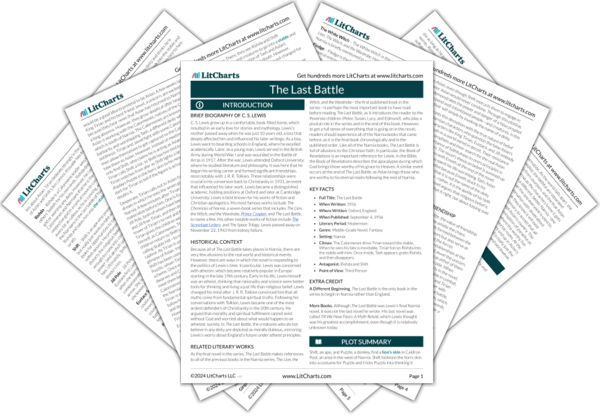Throughout The Last Battle, the value of friendship stands as a beacon of hope amidst the chaos engulfing Narnia. The bonds formed between the characters not only offer emotional support but also serve as the foundation for their resistance against the forces threatening to destroy Narnia. One of the relationships at the heart of the novel is between King Tirian and Jewel the unicorn. Tirian and Jewel have been friends for as long as either of them can remember and are always by one another’s side. When Tirian runs into trouble with the Calormenes early in the novel, Jewel helps him escape, and when Jewel is in trouble in combat, Tirian rushes to his side. Furthermore, when Jewel and Tirian are not in immediate danger, they provide one another with companionship and emotional support. Before the final battle, they each talk about how much the other means to them, which gives them the strength to face Rishda’s forces. In other words, friendship is not a light commitment in this novel, but rather a serious bond, which ties two individuals together for life.
Friendship is also the tool through which those on the wrong side of the battlefield are brought into Aslan’s good graces. For instance, Jill befriends Puzzle the donkey and informs him of the error of his ways. Because of Jill, Puzzle realizes that Shift only pretended to be his friend. Jill and the other Narnians show Puzzle what real friendship is by treating him with respect and aiding him whenever necessary. In sharp contrast to the friendships depicted on the Narnian side are the false bonds created by the Calormenes and doubters of Aslan. For instance, Rishda’s behavior in and out of battle demonstrates that he is only looking out for himself. He hardly cares when Ginger the cat goes missing, and he is willing to send his men to die as long as he gets power and vengeance in the end. In other words, Rishda is profoundly selfish, and, in the end, his selfishness is his downfall, as he ends up in the hands of Tash. Ultimately, through the portrayal of authentic friendships and their juxtaposition with superficial allegiances, Lewis illustrates that the value of true companionship is not merely in the comfort it provides but in its capacity to uplift individuals morally, emotionally, and spiritually.
The Value of Friendship ThemeTracker

The Value of Friendship Quotes in The Last Battle
Chapter 1 Quotes
There were very few Talking Beasts or Men or Dwarfs, or people of any sort, in that part of the wood, but Shift had one friend and neighbor who was a donkey called Puzzle. At least they both said they were friends, but from the way things went on you might have thought Puzzle was more like Shift’s servant than his friend. He did all the work. When they went together to the river, Shift filled the big skin bottles with water but it was Puzzle who carried them back. [...] Puzzle never complained, because he knew that Shift was far cleverer than himself and he thought it was very kind of Shift to be friends with him at all.
Chapter 6 Quotes
“What are you doing, Sire?” asked Jewel sharply.
“Drawing my sword to smite off the head of the accursed Ass,” said Tirian in a terrible voice. “Stand clear, girl.”
“Oh don’t, please don’t,” said Jill. “Really, you mustn’t. It wasn’t his fault. It was all the Ape. He didn’t know any better. And he’s very sorry. He’s a nice Donkey. His name’s Puzzle. And I’ve got my arms round his neck.”
Chapter 9 Quotes
“I was going to say I wished we’d never come. But I don’t, I don’t, I don’t. Even if we are killed. I’d rather be killed fighting for Narnia than grow old and stupid at home and perhaps go about in a bath-chair and then die in the end just the same.”
“Or be smashed up by British Railways!”
“Why d’you say that?”
“Well when that awful jerk came—the one that seemed to throw us into Narnia—I thought it was the beginning of a railway accident. So I was jolly glad to find ourselves here instead.”
Chapter 16 Quotes
And the very first person whom Aslan called to him was Puzzle the Donkey. You never saw a donkey look feebler and sillier than Puzzle did as he walked up to Aslan, and he looked, beside Aslan, as small as a kitten looks beside a St. Bernard. The Lion bowed down his head and whispered something to Puzzle at which his long ears went down, but then he said something else at which the ears perked up again. The humans couldn’t hear what he had said either time.











